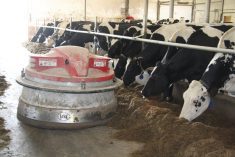GREAT FALLS, Mont. – Almost every day, Art Adamson watches truckloads of Canadian grain pass by his Montana farm.
While Adamson and his neighbors don’t like the sight of Saskatchewan or Alberta licence plates at local grain elevators, he admits if he could get a top price in Canada for his wheat or barley he’d probably head north to sell his crop.
Montana farmers realize the Canadian convoys are partly a challenge to the Canadian Wheat Board’s monopoly on export grain, but they wonder who profits in the end.
Read Also

Manitoba extends Crown land rent freeze
Manitoba government links the continued rental rate freeze on grazing and forage leases to economic and environmental challenges facing the industry
“In my view the multinational grain corporations are the only ones who are making any profit,” said Adam-son during an interview at the Montana Farmers Union convention here.
Tension in the northern states over the grain traffic led to an international quota agreement last year which has since expired.
The quota eliminated five-hour waits to unload at Montana and North Dakota elevators. Yet farmers who couldn’t sell their grain faced a long winter short of cash, said Montana Farmers Union president Norm Sullivan.
Bitterness resulted.
Sullivan said the farmers union blamed the U.S. government for signing trade agreements that allowed the grain in, as well as permitting grain companies to buy raw product wherever they pleased.
Keep in check
“Our grain companies can purchase grain anywhere at the lowest common denominator. You folks happened to have a crop they could do that with that year and it hurt our producers badly,” he said. “We hope it doesn’t get out of hand again.”
For those who criticize the wheat board as an unfair monopoly, Sullivan said it’s hypocritical because the handful of multinational corporations controlling the world grain trade are simply larger monopolies.
To Sullivan, demands for the dismantling of the wheat board by Americans is out of line.
As for price premiums in the American market, Sullivan doesn’t believe it will last.
“If they get rid of the wheat board, I will bet that within three to five years neither one of us will get a premium to speak of.”
Sen. Max Baucus said the south-ward flow of Canadian grain was not spurred by the signing of the North American Free Trade Agreement despite the farm union’s claims.
“The fact is there’s nothing in NAFTA that has anything to do with this,” he said in an interview.
“We need to get the job done and find some long-term understanding between the two countries,” Baucus said.
North Dakota farmer Alan Berg-man said the wheat board serves Canada well, even if there are some suspicions on his side of the border about how the board conducts business as a single-desk seller.
“We should have one for ourselves,” said the president of the North Dakota Farmers’ Union.
“Most of our producers would accept that it is a Canadian issue to be decided but you have to admit that it complicates trade agreements,” said Bergman.
As a committee member of the International Trade Commission investigation of the grain trade, Bergman said he won’t sign the report when it’s finally released. He said it was negative and he would not sign another report that had all negatives from a producer’s standpoint.
Lee Swenson, president of the national farmers’ union in the U.S., said he’s concerned that attacks on the wheat board are led by large corporations who will gain economically in the future by spreading misinformation about how the board operates and who it serves.
“As Canada moves to eliminate the Canadian Wheat Board, I don’t think they understood at all yet the manipulation of which producers will live under (by multinational grain traders),” said Swenson.















